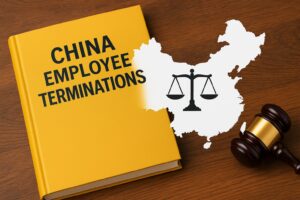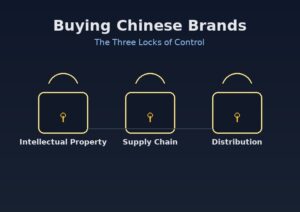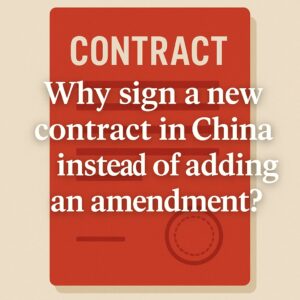Just got the below comment (#63 on our post, China: First Let’s Clear Out The Long Time Foreigners) posing important questions and leaving hanging some common misconceptions about doing business in China:
So here’s my question albeit already bounced around but no solid answer given….
JV or WFOE for a new foreign company launching in China?
I am about to launch my company that I have been planning for 8 years and will do things by the book, no qualms about that, but I don’t want to start the thing in a realm of probable employee threats, and local competitor company lordship privileges.
Especially if it’s capable of being taken away from me over 5 mao (50 cents) missing in a tax audit because someone has decided that my company will look better in the hands of my local competition.
I have seen many situations of law bending to suit local businesspeople to their advantage, and in those situations the victims of such law bending have almost always had little power to protect themselves.
Would not JV be the better option over WFOE?
At least with a local person in a directors chair it would be harder for sharks to pull the company down.
The whole idea of building a company here in China is fearful and daunting but it’s what I want to do.
Re: Operating illegal biz in China;
I care not that the govt. closes them down. It would be exactly the same in my homeland.
Should that happen, they only have themselves to blame.
Lawbreaking is lawbreaking in any language.
Yet I do agree, Chinese law is ambiguous by nature and isn’t self explanatory where it should be.
I was asked nearly the exact same question not long ago when I was lecturing at a law school on the legal basics of foreign investment into China. And just as I did then, I am going to break down this series of questions and statements and answer it.
Here goes.
1. “JV or WFOE for a new foreign company launching in China?” Sorry. Impossible to answer. There are too many variables that go into this determination and you have really only discussed one, and it is one I do not even see as being terribly relevant. In making this decision, the first question that must be asked is whether the business you are planning is legal as either a WFOE (Wholly Foreign Owned Entity) or a JV (Joint Venture). Most types of businesses can be operated by foreign businesses in China as either a WFOE or a JV, but there are still some businesses that are completely off limits to foreigners and there are still some businesses that must be operated as a joint venture and not as a WFOE. There is also sometimes the possibility of operating your business as a Representative Office, but the situations in which that makes sense are fairly rare and the scope of those businesses will always be very limited.
Assuming you can enter China as either a WFOE or a JV, the hard analysis must now begin. Speaking very generally, WFOEs give you greater control than a Joint Venture. Joint Ventures give you the advantage of having a local partner to help you negotiate new territory and also someone with whom you can share the work and the expenses.
2. “At least with a local person in a director’s chair it would be harder for sharks to pull the company down.” You can put a local person in your WFOE director’s chair if you wish. You seem to believe that a WFOE is more likely to be pulled down by sharks than a Joint Venture, but my experience is that the shark most likely to pull down your business is the one you have invited into your swimming pool. All I can tell you is that my law firm has never worked on a matter involving a WFOE that got “pulled down” when it was operating legally. I am not saying this cannot happen, but I have never heard of anything like the example you give of a WFOE being shut down for failing to pay 5 mao in taxes.
My law firm has handled a number of matters for WFOEs that have gotten in trouble with the Chinese government for things like pollution, zoning issues, tax issues, employment issues, etc., and there have definitely been times where our clients have had to pay fines and there were times we did not think those fines were particularly fair. But I am not aware of any client of my law firm or any legitimate WFOE operating anywhere in China being shut down for a minor infraction. I am aware of China changing its rules and making what was once legal for foreigners no longer legal for foreigners with terrible business ramifications, but that is a different issue.
On the flip side, I estimate maybe around ten percent (or maybe even more) of my firm’s revenues from its China practice each year comes from our representing foreign companies in a joint venture gone bad. We are typically working on anywhere from one to three of these failed joint venture deals at any given time and they are seldom pretty. If you are a foreign company and you have entered into a joint venture in a third-tier Chinese city and your joint venture agreement was badly written in terms of protecting you, you will be lucky to get past the shark in your pool without losing at least half your fingers and toes.
My experience (and I think virtually every China lawyer will agree with me on this) is that you are at much greater risk of being eaten by a joint venture than by a WFOE.
3. “Yet I do agree, Chinese law is ambiguous by nature and isn’t self explanatory where it should be.” This is an exaggeration when it comes to China business law. Much of the belief that China’s business laws are ambiguous stems not from the laws themselves, but from their varying (and almost universally poor) translations and from people who claim they know what the laws say without ever having read them. China’s business laws on foreign investment are, for the most part, very well written and very clear. The laws on how to form a WFOE in China have stayed the same for quite some time and are quite clear.
My best advice to you is that you figure out what will be best for your situation, taking into account China’s laws and your realities on the ground.

























